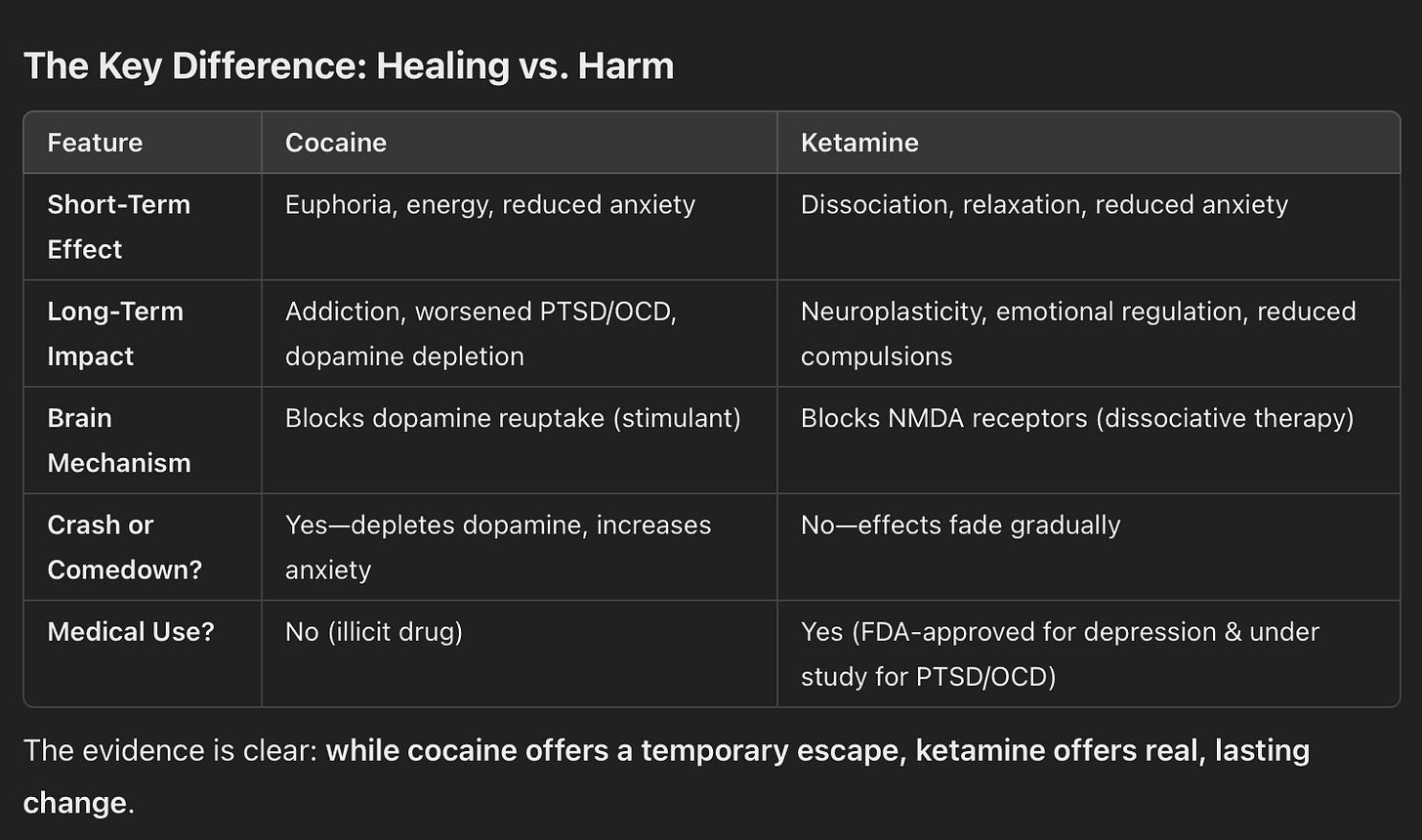The Illusion of Cocaine vs. The Reality of Ketamine: A New Approach to PTSD & OCD
Cocaine offers a dopamine-driven high, but ketamine changes brain chemistry for lasting results.
Cocaine and ketamine both alter brain chemistry, but while cocaine provides short-term euphoria and worsens PTSD & OCD symptoms over time, ketamine offers a scientifically backed treatment that promotes long-term healing and neuroplasticity.
Cocaine creates a temporary escape, but leads to long-term harm. It rapidly floods the brain with dopamine, providing short-term relief from PTSD and OCD symptoms.
Ketamine works differently, rewiring the brain for healing. It reduces emotional reactivity to trauma, disrupts obsessive thought loops, and offers rapid relief without withdrawal effects.
Studies show ketamine significantly reduces PTSD and OCD symptoms within hours, whereas traditional treatments can take weeks or fail entirely.
For those struggling with PTSD or OCD, the real question isn’t just about feeling better today—but about healing for the future!!
The Illusion of Cocaine vs. The Reality of Ketamine: A New Approach to PTSD & OCD
The Search for Relief
For individuals with PTSD and OCD, daily life can feel like an ongoing battle. Intrusive thoughts, compulsions, hypervigilance, and emotional dysregulation make it difficult to find peace.
Many turn to substances like cocaine for immediate relief, experiencing a fleeting escape from anxiety and obsessive thoughts. But this relief is short-lived, and the cycle of dopamine crashes, dependency, and worsened symptoms soon follows.
On the other hand, ketamine is emerging as a revolutionary treatment for PTSD and OCD, offering rapid relief and long-term healing without the destructive aftermath of stimulant abuse.
While cocaine depletes the brain’s reward system, ketamine rewires neural pathways, reduces symptoms, and fosters emotional resilience.
This article explores why one drug destroys while the other heals—and what the science says about their effects.
Cocaine’s Short-Term Euphoria vs. Long-Term Damage
How Cocaine Works
Cocaine is a powerful stimulant that floods the brain with dopamine, creating feelings of euphoria, confidence, and high energy.
It does this by blocking dopamine reuptake, preventing neurons from absorbing it back into the system.
This leaves large amounts of dopamine trapped in the brain’s reward circuits, making the user feel powerful, focused, and socially uninhibited.
For someone with PTSD or OCD, this can feel like a miracle—racing thoughts slow down, compulsions temporarily disappear, and emotional pain is replaced with pleasure.
Why Cocaine Feels Like an Escape for PTSD & OCD Patients
Temporary Anxiety Relief: The intense dopamine surge can momentarily quiet hypervigilance and intrusive thoughts.
Sense of Control: Cocaine can make users feel invincible, counteracting the feelings of powerlessness that trauma or OCD often create.
Increased Focus & Motivation: Some users report that cocaine improves their ability to concentrate, even on tasks that felt impossible before.
However, these effects don’t last.
The Crash & Cycle of Dependence
Severe Dopamine Depletion: After the high fades, dopamine levels plummet, leading to anxiety, irritability, and depression.
Stronger Compulsions & PTSD Symptoms: Studies show that chronic cocaine use worsens obsessive thinking and emotional dysregulation, making PTSD and OCD symptoms even more intense after withdrawal.
Addiction Risk: As the brain adapts to frequent dopamine surges, users need higher doses to achieve the same high, increasing the risk of addiction.
Cocaine may feel like an effective short-term solution, but it ultimately deepens the problem—creating stronger compulsions, emotional instability, and heightened PTSD symptoms over time.
Ketamine: A Revolutionary Treatment for PTSD & OCD
Unlike cocaine, ketamine does not rely on dopamine manipulation. Instead, it acts as an NMDA receptor antagonist, affecting the brain’s glutamate system. This promotes neuroplasticity—the brain’s ability to form new neural connections—helping patients break free from rigid thought patterns and emotional loops.
Ketamine’s Benefits for PTSD & OCD:
Weakens Traumatic Memory Reconsolidation: PTSD symptoms are often fueled by the brain’s tendency to relive traumatic memories over and over again. Studies show that ketamine reduces emotional reactivity to traumatic memories, helping patients process them in a healthier way.
Interrupts Obsessive Thought Loops: In OCD, the brain gets stuck in repetitive cycles of intrusive thoughts and compulsions. Ketamine’s impact on glutamate allows for greater cognitive flexibility, helping patients break free from these thought loops.
Rapid Relief Without Dopamine Depletion: Unlike cocaine, which drains the brain’s reward system, ketamine actually enhances emotional regulation without leading to addiction or crashes.
Why Isn’t Ketamine More Widely Used Yet?
Despite its promising benefits, ketamine is not yet the first-line treatment for PTSD and OCD due to several factors:
Limited Insurance Coverage: Many ketamine treatments are expensive and not fully covered by insurance, making accessibility a challenge.
More Research Needed: While early studies show strong positive results, long-term research is still ongoing to determine optimal dosing and safety profiles.
Stigma Around Psychedelic-Like Treatments: Some mental health professionals remain hesitant to embrace ketamine due to its dissociative effects, despite growing clinical evidence of its benefits.
However, with continued research and advocacy, ketamine therapy is expected to become more mainstream in mental health treatment.
Long-Term Benefits of Ketamine Beyond PTSD & OCD
Beyond symptom relief, ketamine has long-lasting effects on brain health that set it apart from traditional psychiatric drugs.
Neuroplasticity and Brain Repair: Unlike cocaine, which erodes mental stability, ketamine promotes brain repair and adaptation, helping patients form healthier thought patterns.
Potential for Addiction Treatment: New research is exploring ketamine for breaking addiction cycles, as it reduces cravings and resets compulsive behaviors.
Anti-Inflammatory Effects: PTSD and OCD are often linked to chronic inflammation in the brain, and ketamine has been shown to reduce neuroinflammation, further aiding mental resilience.
These findings suggest that ketamine is not just a band-aid solution—it may actually help rewire the brain for long-term healing.
You have a choice between false relief and real healing.
Final Thoughts
For individuals with PTSD and OCD, the search for relief is understandable. Cocaine may seem like an easy fix, but it creates a cycle of worsening symptoms, emotional instability, and dependency.
In contrast, ketamine is showing real promise as a long-term solution—helping rewire the brain, reduce symptoms, and promote healing without the risk of addiction and neurotoxicity.
The future of PTSD and OCD treatment is moving away from substances that damage the brain and toward therapies that repair it. While cocaine offers euphoria, ketamine offers transformation.
For those struggling with PTSD and OCD, the real question isn’t just about feeling better today—but about healing for the future..
Thank you for reading this article.
Music Recommendations
Recent Articles👩⚕️✍️
Psychedelics and Neuroplasticity: A New Era of Brain Healing
Psychedelics and Neuroplasticity: A New Era of Brain Healing
Breaking Free From Depression & PTSD: How Psilocybin Rewires The Brain
Psilocybin-assisted psychotherapy is on the cusp of being approved to treat Major Depressive Disorder (MDD) and other mental health conditions such as cancer-related depression, anxiety, and obsessive-compulsive disorder (OCD).
Cold Exposure & Heat Therapy: The Science of Ice Baths, Saunas, & Recovery
Cold Exposure & Heat Therapy: The Science of Ice Baths, Saunas, & Recovery
Looking for Quick, Mindful Workouts to Elevate Your Fitness Routine? 👇⏰💪
Check out my ebook, A Pocket Book of Express Mindful Workouts, designed to help you seamlessly integrate daily movement into your modern life.
This ebook features 20 express, mindful workouts, each just 17 minutes long, making it easy to stay active wherever you are—whether at home, in a hotel, or even outdoors.
An Express Mindful Workout combines physical movement with mindfulness, focusing on maintaining proper form and controlled breathing.
These quick routines will test your mental toughness, improve cardiovascular fitness, and build muscle strength, all while helping you develop a consistent daily workout practice.
Best of all, you can download the ebook instantly and carry it with you wherever you go.
So, no matter how busy your schedule, you’ll always have time to get moving!!
Grab your copy today and start building the foundation for your optimal health! CLICK HERE!!
Manifest Your Mornings with The Perfect Sunrise 🌅✨
Every new day holds the energy of fresh beginnings.🌅🌆
My exclusive collection of sunrise photos captures the tranquil magic of the morning sun and tropical shores at dawn—ideal for screen savers, digital vision boards, social media posts, and more.🏝️🌊
Elevate Your Environment & Attract Positivity with Every Sunrise.📲🌅
A pack of 10 high-resolution digital photo downloads.
Stunning, beautiful screen savers & wallpapers.
Perfect for Law of Attraction & manifestation rituals.
Instant access for social media & creative, digital projects.
Instant download, endless inspiration—immerse yourself in the warmth of paradise today!!🌅🏝️
Click here to gain access to my incredible sunrise photos packs.👈
MEDICAL DISCLAIMER
This content is for informational and educational purposes only. It is not intended to provide medical advice or to take the place of such advice or treatment from a personal physician. All readers/viewers of this content are advised to consult their doctors or qualified health professionals regarding specific health questions. All viewers of this content, especially those taking prescription or over-the-counter medications, should consult their physicians before beginning any nutrition, supplement or lifestyle program.

















Amazing 👏🏻 this article is an eye opening.
Whoa… thanks for the write up! Can’t wait to see more research coming out on this stuff. I have heard that Ketamine can also help as a fast acting anti depressant. No need to sniff things all up in your nose!